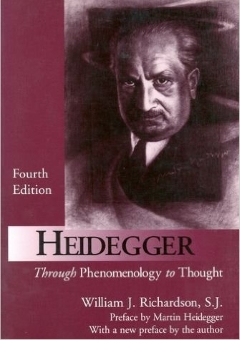Repository | Series | Book
Heidegger
Through phenomenology to thought
Abstract
Dear Father Richardson: It is with some hesitation that I attempt to answer the two principal questions you posed in your letter of March I, 1962. The first touches on the initial impetus that determined the way my thought would gO. l The other looks for information about the much discussed "reversal" [in my development]. I hesitate with my answers, for they are necessarily no more than indications [of much more to be said]. The lesson of long experience leads me to surmise that such indications will not be taken as directions for the road of independent reflection on the matter pointed out which each must travel for himself. [Instead they] will gain notice as though they were an opinion I had ex pressed, and will be propagated as such. Every effort to bring what has been thought closer to prevailing modes of (re)presen tation must assimilate what-is-to-be-thought to those (re)presen tations and thereby inevitably deform the matter. 2 This preamble is not the lament of a man misunderstood; it is rather the recognition of an almost insurmountable difficulty in making oneself understood. The first question in your letter reads: "How are we properly to understand your first experience of the Being-question in 1 [Translator's note. With regard to the translati~ of Denken, see below, p. 16, note 43. ] I [Translator's note. For the translation of VorsteUung by "(re)presentation," see below, p. 108, note 5. ] VORWORT Sehr geehrter Herr P.
Details | Table of Contents
pp.n/a
pp.301-308
https://doi.org/10.1007/978-94-010-1976-7_9rilke
pp.391-400
https://doi.org/10.1007/978-94-010-1976-7_16pp.403-417
https://doi.org/10.1007/978-94-010-1976-7_17epilogue
pp.473-483
https://doi.org/10.1007/978-94-010-1976-7_22pp.502-513
https://doi.org/10.1007/978-94-010-1976-7_25introduction the essence of ground
pp.562-565
https://doi.org/10.1007/978-94-010-1976-7_30Publication details
Publisher: Nijhoff
Place: Den Haag
Year: 1963
Pages: 764, xxix
Series: Phaenomenologica
Series volume: 13
DOI: 10.1007/978-94-010-1976-7
ISBN (hardback): 978-94-010-1978-1
ISBN (digital): 978-94-010-1976-7
Full citation:
Richardson William (1963) Heidegger: Through phenomenology to thought. Den Haag, Nijhoff.




